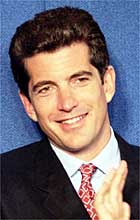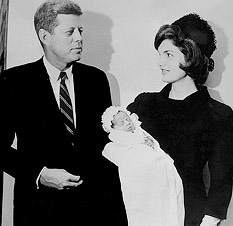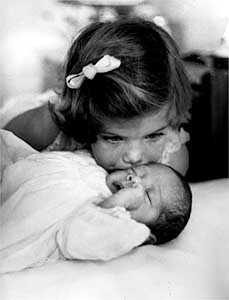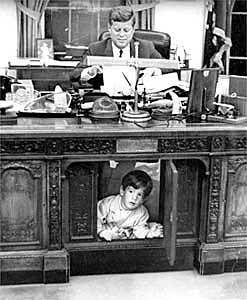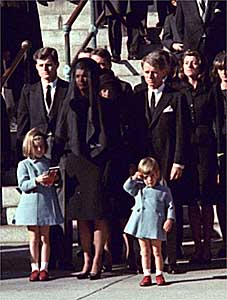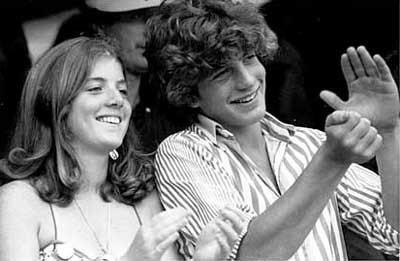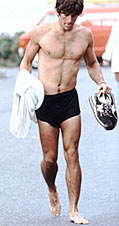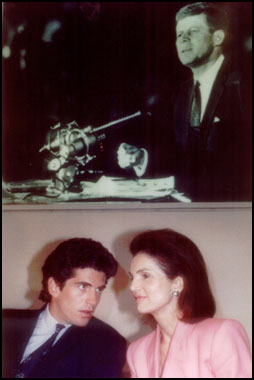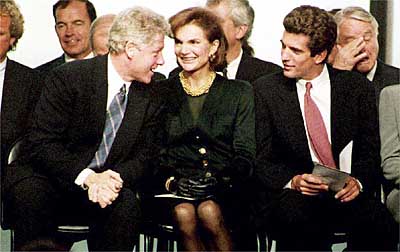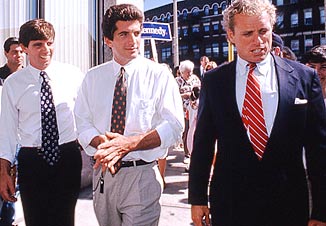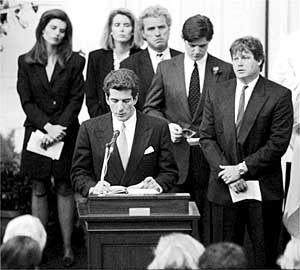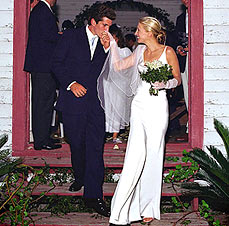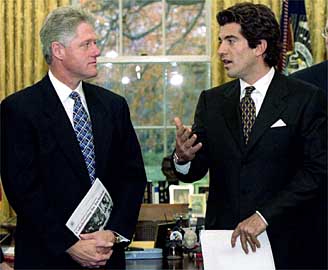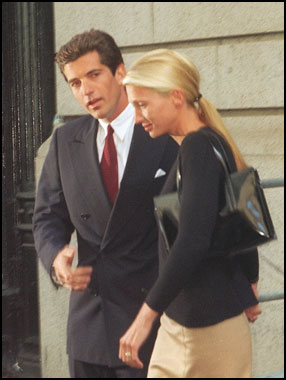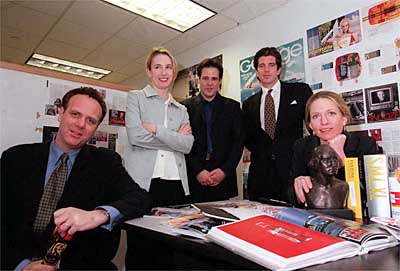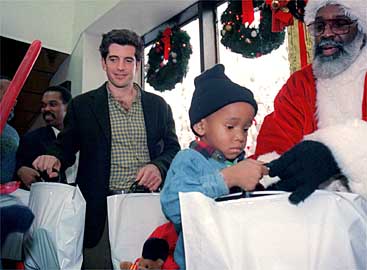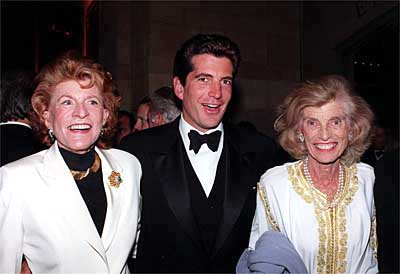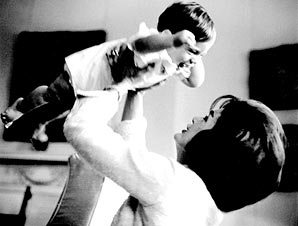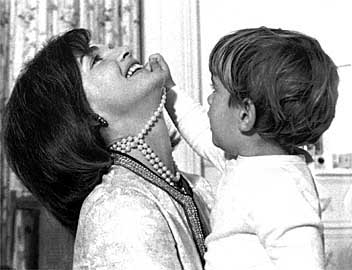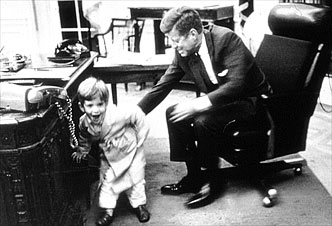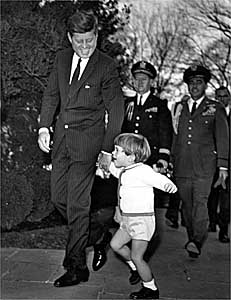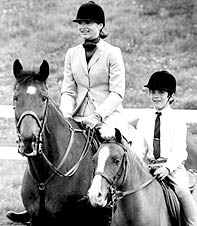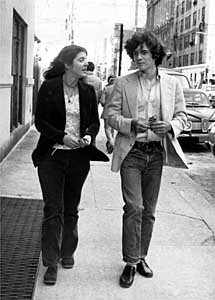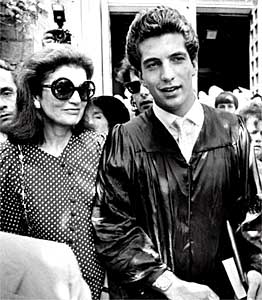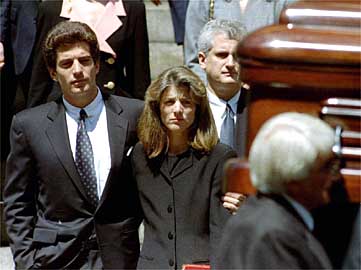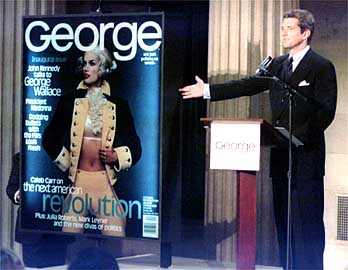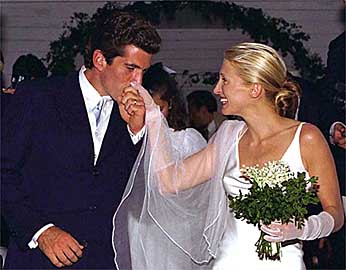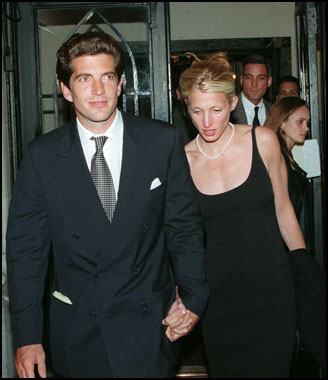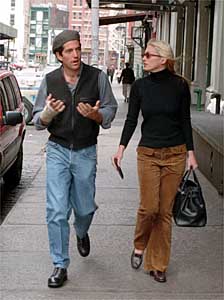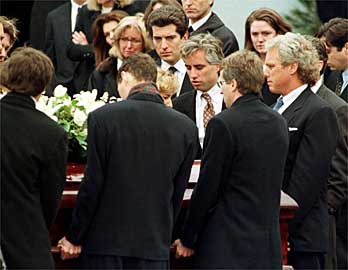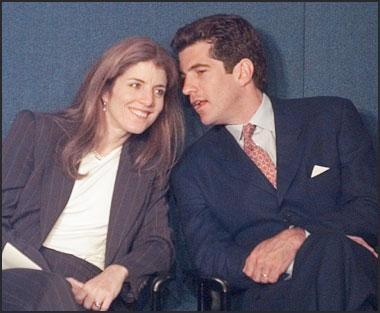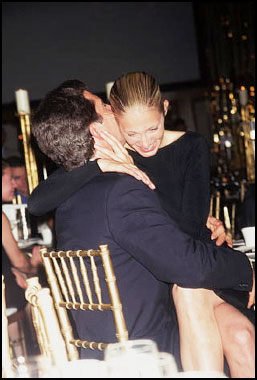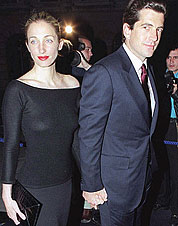July 19, 1999John F. Kennedy Jr., 38, Heir to a Formidable DynastyBy KATHARINE Q. SEELYEWASHINGTON -- John F. Kennedy Jr., a scion of the nation's most celebrated political dynasty, was reported lost and presumed dead in an accident that resounded this weekend with echoes of the family's many misfortunes.
Jim Bourg / Reuters John F. Kennedy Jr. during a ceremony at the JFK Presidential Library in Boston last year. Kennedy, 38, has been missing since Friday night after the plane he was flying to a cousin's wedding on Cape Cod failed to arrive on Martha's Vineyard. His disappearance in the prime of his life, like the deaths of his father, two uncles, an aunt and two cousins before him, only added to the perception that his larger-than-life family has been besieged by a near-biblical blight. Kennedy, son of the 35th president, was touched by both the Kennedy charisma and its curse. The public ached in 1963 as it watched him, in his blue dresscoat and short pants, salute his slain father. It cheered as he emerged with his dazzling bride from their secret wedding in 1996. And as he sought a measure of privacy even while forsaking a career in law or government for a role in publishing, the public never ceased dwelling on his future and the swings of his family's fortunes between triumph and disaster. Guiding his life was a scriptural passage, Luke 12:48, that was voiced frequently by his grandmother Rose and paraphrased by his father: "Of those to whom much is given, much is required." Kennedy taught English to underprivileged children, aided people who were homeless and disabled, and was a patron of the arts. But like many sons of famous fathers, Kennedy still seemed to be searching for his place in the public constellation, the expectations for him as great as his father's legend was gripping. And he was conscious of his burden as an American icon. "It's hard for me to talk about a legacy or a mystique," Kennedy said in a 1993 interview. "It's my family. The fact that there have been difficulties and hardships, or obstacles, makes us closer." He was most recently founder and editor of George, a glossy journal of politics, but some of his family's admirers still hoped his venture into publishing was merely a prologue to a career in politics. While he helped the Democratic Party raise money, he never ran for office. He made his political debut at the 1988 Democratic National Convention in Atlanta, where he introduced his uncle, Sen. Edward Kennedy, D-Mass. Invoking his father's inaugural speech, which called a generation to public service, he received a two-minute standing ovation. Cameras swarmed after him wherever he went, whether it was as a toddler playing under his father's desk in the White House, or as a young lawyer and avid athlete who was often photographed shirtless. In 1988 People Magazine called him "the sexiest man alive." John Fitzgerald Kennedy Jr. was born on Thanksgiving Day, Nov. 25, 1960, just three weeks after his father, John Fitzgerald Kennedy, was elected president. He was the first infant to live in the White House since 1893. President Kennedy's funeral was held on his son's third birthday. In one indelible moment of family heartache and American history, the boy stood outside St. Matthew's Cathedral in Washington with his mother and sister, raising his hand in a salute as he squinted in the sun while his father's coffin rolled by. His mother, Jacqueline Bouvier Kennedy, had leaned down and whispered to him in advance to salute, a gesture the boy had seen many times as military escorts greeted the commander in chief. After his father's death, his mother moved the family to an apartment on the Upper East Side of Manhattan. Security was always a major preoccupation. When her son was six, Mrs. Kennedy commented on his maturity, adding, "Sometimes it almost seems that he is trying to protect me instead of just the other way around." He attended a Catholic elementary school and was so rambunctious that Secret Service agents gave him the code name "Lark." But his mother worried about her children's safety, especially after Robert F. Kennedy, their uncle, was assassinated in 1968. "If they're killing Kennedys, then my children are targets," Jacqueline Kennedy said at the time. "I want to get out of this country." On Oct. 20, 1968, she married Aristotle Socrates Onassis, a Greek shipping magnate who was 29 years her senior, in part because of his ability to provide the family security. Mrs. Onassis, one of the world's most fabled women, sought desperately to give her children a normal life. Once when John was 13 and mugged in Central Park, his mother said it was a good experience for him. According to family files recently made public, Mrs. Onassis told her bodyguards that her son "must be allowed to experience life," and that "unless he is allowed freedom, he'll be a vegetable." As an adult, John made a point of taking public transportation in New York. "I have a pretty normal life, surprisingly," he told Larry King. He attended Collegiate School for Boys in New York but enrolled in 11th grade at Philips Academy in Andover, Mass. Breaking with family tradition, he went to Brown University instead of Harvard, graduating in 1983. He majored in American history and was a member of the Phi Kappa Psi fraternity. He once appeared to aspire to be an actor, and participated in numerous amateur theater productions, but his mother worried that the stage life would expose him too much to the media from which she had tried to shelter him. Eventually, he enrolled in law school at New York University, mostly, friends said, to please his mother. He failed the New York bar exam twice before passing, which allowed him to keep his job as a prosecutor in the office of Robert Morgenthau, the Manhattan district attorney. "I'm clearly not a major legal genius," he said after the New York tabloids labeled him the "Hunk Who Flunked." After four years as an assistant district attorney, and a perfect 6-0 conviction record, he let it be known that the law bored him. As he left the district attorney's office, he told a friend, "I don't want to be just another passenger on a liner." At 34, he started George magazine in a joint venture with Hachette Filipacchi, a media conglomerate. For the scion of America's most illustrious political dynasty, the magazine was a vehicle that both connected him to his family's past and enabled him to strike out on his own. Kennedy, who did not use either his middle initial or Jr. on his business cards, observed in a 1998 interview with USA Today, "I think everyone needs to feel they've created something that was their own, on their own terms." He appeared in George as both an interviewer and essayist. In a much-discussed George essay published in August 1997, he described his first cousins Joseph and Michael as "poster boys for bad behavior." He seemed to enjoy being provocative, posing semi-nude in George and inviting Hustler magazine publisher Larry Flynt to be his magazine's guest at the annual White House correspondents' dinner in Washington last spring. Last March, he visited the imprisoned boxer Mike Tyson, whom Kennedy pronounced "a friend" who was "much different" from his public image. On Sept. 21, 1996, he married a fashion publicist, Carolyn Bessette, on a barrier island off the coast of Georgia. The couple lived in Manhattan. He served on the boards of several family foundations and a number of nonprofit organizations. Since 1989 he had headed Reaching Up, a nonprofit group that provides educational and other opportunities for workers who help people with disabilities. William Ebenstein, executive director of Reaching Up, said, "He was always concerned with the working poor, and his family always had an interest in helping them." Ebenstein said Kennedy helped expand the organization. He also pursued his family's enthusiasm for all types of athletic endeavors. The 6-foot-1, 190-pound fitness enthusiast liked to bicycle, rollerblade, dance and throw footballs. Not long ago, he flew to South Dakota to visit Mount Rushmore. Officials at the national shrine refused his request to rappel down the monument, although he was permitted to climb onto the 60-foot faces of Jefferson, Roosevelt, Lincoln and Washington. He was sidelined after he broke his ankle over Memorial Day weekend on Martha's Vineyard. Although he repeatedly played down expectations that he would one day mount his own political climb, the dream persisted. A few months ago, Alfonse D'Amato, the former Republican senator from New York who signed on as a contributor to George, said Kennedy would make a strong candidate for mayor in New York City, a suggestion that Kennedy laughed off. "A public career is -- it's a lot to bite off," he said in a televised interview four years ago. "And you better be ready for it, and you better have your life set up for it, and you better be prepared to do it for the long haul." Kennedy is survived by his sister, Caroline Kennedy Schlossberg, of Manhattan. |
